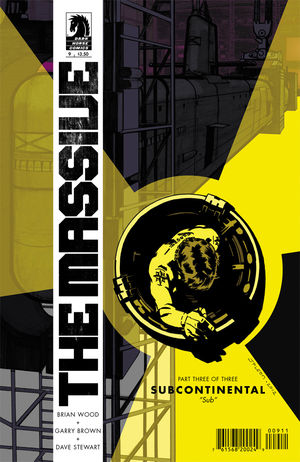The Massive #9 Review
By Zak Edwards
February 27, 2013 - 21:56
Dark Horse Comics
Writer(s): Brian Wood
Penciller(s): Garry Brown
Colourist(s): Dave Stewart
Letterer(s): Jared K. Flethcher
Cover Artist(s): J.P. Leon
$3.50 US
I have been rereading George Orwell’s Animal Farm recently and thinking about the concept of utopia for much (who am I kidding, all) of my graduate education. The notion is at once complex and impossible. Perhaps Immanuel Kant said it best when he wrote that we can (and I paraphrase) “hope for a hope” when it comes to an ideal society. I think something Orwell is saying with his book, about a revolution on a farm in Britain, is that our capacity to build a utopia is far outweighed by our inability. This is a commentary on human nature, as much as I cringe at such a concept, but also our institutional limitations. Perhaps the notion of human perfectability is impossible, perhaps a society that relies on the ignoring or rejecting of negativity is doomed to destructive introspection that results in our gradual individualization. To paraphrase a bunch of big words: we are completely and totally screwed.
 |
The entire issue plays with the concept of where our sympathies should lie and gives the answer of everyone. Part of this is Wood’s brilliant characterization, part is the story’s set-up and execution. Sumon is a man of compromised ideals, but Israel demands his entire crew, no exceptions, join him back on his ship. Both are leaders acting undemocratically under the guise of necessity and, well, democracy. The kindness of strangers in the Georg plot is rewarded with Georg holding a boy at gunpoint for shoes and passage to the sea. The gruff man decoding audio tapes shows genuine concern for Ryan, hoping she is able to help and not simply "involved." His recommendation? “Go home.” Leave this place before your idealism is compromised, which emphasizes how that idealism is still important and necessary, even if it seems to end up at Moksha: the utopia/prison. Wood painfully ends the story with a brief history of how Moksha too has failed: the citizens have been returned to their home countries and Moksha has been found guilty for being a relay for some of the worst criminals in the region. Orwell’s pigs now stand upright.
Related Articles:
The 2014 Top Shelf Massive $3 Sale Launched
Fantagraphics Books Announces "Massive" Gay Manga
The Massive #15 Review
The Massive #14 Review
The Massive #13 Review
The Massive #12 Review
The Massive #11 Review
The Massive #10 Review
The Massive #9 Review
The Massive #9 Advance Review
